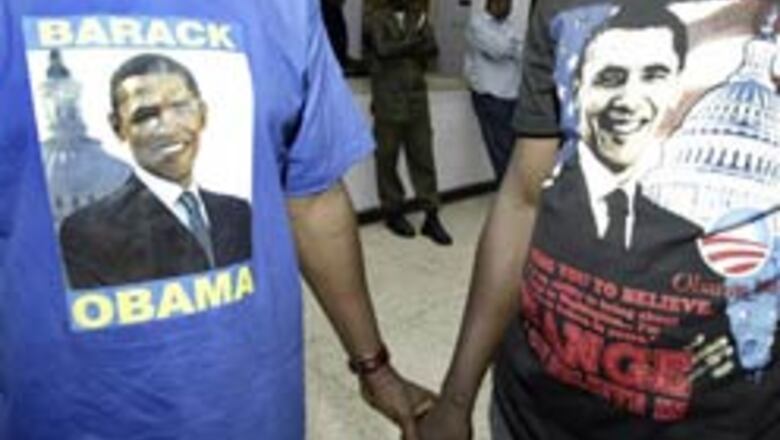
views
Washington: Democrat Barack Obama churned relentlessly toward history, snaring pivotal Pennsylvania as he rolled up an early lead over Republican John McCain that gave him what appeared to be insurmountable momentum in his bid to become the first black American president.
With polls closing quickly throughout the United States, The Associated Press had called 15 states and the District of Columbia for Obama. Nine had been awarded to McCain, who trailed his 47-year-old rival and fellow Senator by 175 electoral votes to 61
The winner will need 270 of the 538 total electoral votes, which are distributed to states roughly in proportion to their population.
A record number of citizens was expected to have cast ballots in an election that stood to change the political face of a nation burdened with its worst economic crisis in nearly 80 years and still fighting wars in Iraq and Afghanistan.
The economy was by far the top issue on voters' minds and a huge drag on McCain, who Obama successfully tied to unpopular President George W Bush.
Obama's victory in Pennsylvania almost assures that he will win all the states that voted Democratic in the 2004 presidential election. Should Obama win one big state that voted Republican in 2004—perhaps Florida or Ohio—or a series of smaller ones, he would be almost certain to win the presidency.
McCain's campaign manager, Rick Davis, on Sunday described Pennsylvania as "the most important state to watch."
Though Obama so far has not locked up a state that voted Republican in 2004, he was favored in several, and others were considered toss-ups.
An Associated Press exit poll found six in 10 voters across the United States named the economy as the most important issue facing the country. None of four other issues on the list—energy, Iraq, terror or health care—was chosen by more than one in 10. The results are based on a preliminary partial sample of nearly 10,000 voters in Election Day exit polls and telephone interviews over the past week for early voters.
An estimated 187 million voters were eligible, and in an indication of interest in the battle for the White House, about 40 million already had voted as election day dawned. Turnout was heavy. In Virginia, for example, officials estimated nearly 75 percent of eligible voters would cast ballots.
PAGE_BREAK
Obama was on the verge of stepping through a door opened 145 years ago when Abraham Lincoln, a fellow Illinois politician, issued the Emancipation Proclamation that freed African-Americans from enslavement in the rebellious South in the midst of a wrenching civil war.
The Illinois senator would be laying claim to the White House on Jan. 20, only 43 years after the country enacted a law that banned the disenfranchisement of blacks in many Southern states where poll taxes and literacy tests were common at the time.
Obama clambered out of political obscurity four years ago with a stunning speech at the Democratic National Convention as he was running a successful campaign to become a U.S. senator from Illinois.
He was awaiting Tuesday's results at home in Chicago after a marathon campaign across 21 months and 49 states. At 47, with only four years in the Senate, he sought election as one of the youngest presidents, and one of the least experienced in national political affairs.
That was not what set the Illinois senator apart, though. As a black man, he confronted a previously unbreakable barrier as he campaigned on twin themes of change and hope in uncertain times.
McCain, a prisoner of war in Vietnam, a generation older than his rival at 72, waited in Arizona to learn the outcome of the election. It was his second try for the White House, following his defeat in the battle for the Republican nomination in 2000.
A conservative, he ran seeking to stress his maverick streak. And a Republican, he did what he could to separate himself from the unpopular Bush.
For the most part, the two presidential candidates and their running mates, Republican Gov. Sarah Palin of Alaska and Democratic Sen. Joe Biden of Delaware, spent weeks campaigning in states that went for Bush four years ago. Virginia, Florida, North Carolina, Ohio, Iowa, Colorado, New Mexico and Nevada drew most of their time. Pennsylvania also drew attention as McCain sought to invade traditionally Democratic turf.
McCain and Obama each won contested nominations — the Democrat outdistancing former first lady Hillary Rodham Clinton — and both promptly set out to claim the mantle of change.
"I am not George W. Bush," McCain said in one debate.
PAGE_BREAK
Obama retorted that he might as well be, telling audiences in state after state that the Republican had voted with the president 90 percent of the time across eight years of the Bush administration.
After voting with her husband, former President Bill Clinton, Sen. Clinton called Bush "the lamest of lame ducks" and predicted that Obama would begin making presidential appointments and announcing economic policies within weeks.
While the Iraq war dominated the campaign early in the year, it had long since faded as an issue as voters cast ballots.
The race was easily the costliest in history, in excess of $1 billion, more after the congressional campaigns were counted.
Figures through mid-October showed Obama had spent roughly $240 million on television and radio advertisements.
McCain had spent about $115 million, and the Republican National Committee another $80 million on his behalf.
















Comments
0 comment